- Home
- Claire North
The Pursuit of William Abbey Page 15
The Pursuit of William Abbey Read online
Page 15
“And are you happy?”
She didn’t answer.
We kept on walking.
At the railway station, Saira drew her robe over her head to hide her baldness, and I paid for a pair of first-class tickets, and the man in the compartment who traded in timber and ballast was horrified to see an unwashed Indian woman in his space, but rather than argue with another white man, he huffed and puffed and moved carriages, so we had the space entirely to ourselves.
Heading south, away from the mountains, away from our shadows, the truth receded with the fires of Vaniyali. Barely an hour of iron rattling, and the ever-present certainty of Saira’s spirit next to mine had receded to a gentle glow of instinct. Two hours later, and when I closed my eyes against the glare of the sun, the only light I saw behind my eyes was my own, and the only certainty I felt in my heart was the old familiar dullness where a better man might have held belief, conviction or love.
Now, for the first time, Saira and I spoke without knowing each other’s hearts, and it was as if a pillar to which she had been chained had been pulled away, and she could collapse, limp as a tissue, onto the floor.
“I had forgotten,” she breathed, “what it was to know myself.”
I didn’t answer, and she glanced my way quickly, surprised by my new-found reticence. “Do you not find it wonderful? To have only your own thoughts in your head, to feel only what you want to feel inside?”
“No,” I replied flatly. “I find it lonely.”
A smile, softer now. She lay sideways across the carriage seats, giggled at her own impropriety, stretched her hands overhead, tangling her fingers in the flickering sunlight through rushing trees. Without the truth on her, she was suddenly younger, a living woman rather than a walking curse. “One day,” she proclaimed, “you will find something worth caring for. You will probably have to abandon your cowardly, wretched and corrupt way of life to achieve it, but I think you can do it, perhaps.”
“That’s a ringing vote of confidence.”
“You can’t tell if I’m lying,” she replied with a hoot of merriment. “For all you know, I might think you’re just as much a coward as you think yourself to be.”
My frozen, cracking heart stopped in my chest, and I slumped back into my seat like a man punched. She glanced over at me, and though the shadow was far behind, the truth was still obvious in my eyes. Swinging her legs rapidly round and sitting bolt upright, she leant across the gap between us, putting her hands in mine, her face only a few inches away. “Foolish man,” she whispered. “Scared boy. I do believe. I do believe. You can be free. One day. You will be. I know it.”
“I don’t know it. I don’t know anything of the sort.”
“Of course not. But the only truth the shadow never shows us is our own. So believe me.” She squeezed my fingers tighter in hers. “I know you better than you know yourself, and I didn’t even make you pay.” For a moment I thought there was something there, a look in her eye that could have been more, something new. Then she looked away, and the moment passed.
Later, I would wonder what more might have been in that moment. But without the certainty of my shadow, I had not asked, not dared to act. In our travels together, we would both sometimes consider sexual relations, not so much because we found each other especially attractive, but in that the intimacy our shadows brought seemed to make physical intercourse faintly inevitable. Thankfully, no sooner had we considered the notion than the other knew of it, and we both at once understood that should our lips meet or our flesh touch, there would be no hiding any awkwardness or unsatisfactory experiences from each other. Oh, perhaps it could have been ecstasy – perhaps it could have been something that the poets describe with shooting stars or volcanoes or some such rot. But the truth could equally have been very, very embarrassing for us both.
Damned this way, or damned the other, I concluded.
“I have to go back to the British,” I said, as we stood outside the station door. “They will hunt me to the ends of the earth if I do not.”
“I will go back to the road,” she replied with a shrug. “It is my duty.” Then: “William. There are… they say there are caves in the north, where the widows go to die. When we cannot walk any further, we go there to purge the last of any love from our hearts, to die angry and alone. It is the safest way, to die lonely, and without friends. They say there are… mysteries there. Questions and answers. If I ever find my way there, and find my way back, I will think of you, and your cure.”
“Thank you.”
“The men you serve: do you trust them? Do you think they are sincere in their promises to you?”
I shook my head. “I don’t know. They never meet me when the truth is near.”
She smiled, tiny teeth in a crooked mouth. “Well,” she mused. “That might tell you something too.”
We did not shake hands, and she did not look back, though I watched her until she was out of sight.
Chapter 36
My employers, when I finally reported in, were furious.
“Where the hell,” Mrs Parr fumed, pacing across the floor of the Delhi hotel the Nineteen shoved me in, “did you go? You left with some… some woman… in the middle of all of that! Mudeford dead, the city on fire, the rani fled, where the hell were you?”
In Burma, her husband had shaken all the hands, walked the walk, smiled the smile and generally been considered a damn fine naval man who’d make a damn fine colonies man. But it had been Mrs Parr who wrote letters to the local businessmen and would-be barons of industry. It had been Mrs Parr who stayed up to three a.m. drafting the proclamation that would hang three revolutionaries and a would-be bomber, who wrote her husband’s reports to London while he lay in a happy opium haze, sacked the judges and hired the sensible men, thank you very much.
I let her shout, and offered a few feeble excuses. The fire, the fighting, the death of Mudeford, Langa had been coming, he was coming…
“You should have telegrammed the moment you were out of danger! Not five days later – five days! We’ve had half the constabulary of India out looking for you! So much for discretion; it’s been chaos, absolute chaos! I want a full report, everywhere you went, everyone you talked to! I can’t believe you were so irresponsible!”
“Yes, Mrs Parr.”
“Irresponsible!”
The baron, huddled up in his chair, watched all of this without a word, hands folded and skin grey. Then, when it was done and Mrs Parr had stormed from the room to shout at the next fool stupid enough to cross her line of sight, he leant in and whispered, “I’m no truth-speaker, boy, but I know when a man’s lying. Be careful she doesn’t.”
With that, he sat back, gave a little nod, and fell asleep.
Vaniyali doesn’t exist any more.
The rani and her children were caught within days, and packed off to an extended vacation in Canada. Lovely rural living to be had in Canada, the British said. When the raja died, the succession passed to a cousin in Mysore, who turned out to have been educated at Eton and had a summer house in Bournemouth and was, all things considered, a very good egg. The kingdom was formally absorbed into its neighbours three years after he came to the throne, and the cousin was able to retire back to Bournemouth with a nice pension and an invitation to tea with the First Lord of the Admiralty, who confirmed the government’s position that everything had turned out really rather splendidly.
And so it goes.
And so it goes.
And so it goes.
Chapter 37
I must have dozed, and woke with a start. Abbey was gone, a blanket over me where I slept, and the Jardin was beginning to stir for another day.
I barely had time to wash my face and straighten out my uniform – Matron couldn’t stand girls what didn’t look perfect – before the day turned insane. Two trucks came down, three stretchers in each and another six men on crutches or carried in the orderlies’ arms. One was a conscientious objector, given a choice between the ambulanc
e and the prison who helped another whose teeth clattered though he weren’t cold. The soldier he carried had his guts pressed up in sheets of parchment paper, and was just holding them – swaddling them like a child – from where they’d fallen out of his belly. He should have been dead. He would be dead in nine hours, but the surgeons had sent him here to die, cos they didn’t have the space up front. I felt angry at that, making it our problem, but Matron spotted him and helped him to lie down and was so kind, just so kind that I felt embarrassed. There was some sort of push going on in the German lines, they said. No one thought it would be here, where the trenches were quiet, and there was a smell on the air, something that burnt.
We didn’t have enough proper beds, so put them what were most likely to survive on sheets and laid the rest out on the floor. I didn’t see Abbey for nearly the best part of the day, except for once when he emerged, coated in blood, to throw his thick rubber gloves to the ground and snap at Helene to stop snivelling. Then he saw me, and looked away, and nearly muttered an apology, and stormed back into the ward. When dinner was called, I ate like I’d never eaten before, and carried my plate with me, still shovelling potato into my mouth – Matron would have been furious if she’d seen it – when they told me that the boy with his gut hanging out were in his last moments.
He didn’t cry when he died. He were too gone for that. He drifted in and out for a little while, and sometimes looked like he’d speak, and then didn’t, as if he couldn’t work out any words. I held the ether mask over his mouth, but we didn’t have much left and weren’t supposed to spend it on the no-hope cases, but we’d all seen this sort of death before and it was easier to die quiet, than to struggle on. Sometimes it were just easier.
I didn’t look for the doctor that night. I was too tired. The moment my shift was done, I went straight upstairs to bed, and lay flat on my face in my filthy uniform. Helene didn’t come to bed immediately, which I were grateful for. I knew she’d be working extra long, extra hard, as I should have been, making sure the ones who died weren’t gonna die alone, hushing them that cried before they could disturb the rest of the boys. I didn’t care. That night, God forgive me, I didn’t care, and I woke with a shock at 4.15 to finally smell myself, see myself, see the sheets I’d stained with all these soldiers’ blood where I’d just collapsed, like an animal, dirty and ashamed.
I tiptoed to the bathroom and washed in frozen water, enjoying the pain of it, and bundled my uniform into the laundry and scrubbed with soap until my hands were red and peeling. Then in my nightgown and socks, my way lit by a storm lamp that creaked with every step like an alarm, I began to head back upstairs to my room, flinching at every glow of light or whisper of voice that I passed by.
That was when I saw Abbey again, heading away from the laundry towards the soldiers’ beds, that same walk I’d seen every doctor use a hundred times, too fast to stop, too fast to think, no place for dead men in his mind. I knew at once, with a strange kind of certainty, where he was going, but I weren’t no truth-speaker. I followed him quietly and peeked round the corner to the officers’ rooms, and sure as eggs, there he was, striding into Lieutenant Charlwood’s room.
Three nights ago, I would have just gone to bed. Matron had lashed discipline into us all, beaten us with her paddle tongue. But I had already broken so many rules, was still breaking them now, and the telling of the doctor’s story had convinced me of only one thing: that a darkness followed him, wherever he went.
I put my lantern down at the end of the corridor, and crept along the walls, tasting something sharp on my tongue, feeling a trembling from my lips to my legs. No one came running, of course, and how much more stupid would I have looked trying to explain myself by creeping than if I had just walked where I had every right to be, but something childish in my soul took hold of me, and I sneaked like a naughty six-year-old to the door of Charlwood’s room.
Abbey had closed it behind him, but these old doors never shut proper unless you put your shoulder into them, letting out the groans of the dying as surely as the secrets of the living. I pushed it back another centimetre, and it was the bravest thing I’d ever done, and could see through the gap the sleeping Charlwood, looking more peaceful now, a strange, shortened lump beneath the sheets, lying on his back, snoring a little, from drugs or nature I didn’t know.
Abbey was watching him.
Just watching him.
Like I watched Abbey.
Once, for a moment, he bent down as if he might smell the sleeping soldier, then pulled back.
And once he put his head in his hands like he couldn’t bear to see what were in front of him.
But mostly he just stood, arms folded, staring.
Then he pulled out the knife.
It was an ordinary pocket knife, with a wooden handle and dark steel blade. It looked like it had travelled a very long way. He held it folded in his hand for a moment, then opened it up, resting the blade against his palm as if he might cut himself with it, then turning the point towards the soldier like he might cut him.
Turns out I’m not a coward. I thought that maybe I was too; after everything Abbey had said, I thought perhaps everyone in this stupid bloody war was a coward.
Not me, it turns out. Something in the dying of men’s eyes made me brave; Matilda, you should have seen it.
I pushed the door open, glaring at Abbey.
He looked briefly ashamed, lowering the blade to his side as if he could undo whatever it was he had been about to do by pretending it weren’t so.
For the longest time, I just glared at him, daring him to say a word, arms folded, feeling ten times bigger than I was.
He stared back, and I wondered what truths he was seeing in my heart, and hardened my face and bunched my fingers into fists and hoped he saw something frightening, solid and real.
He looked away, and I didn’t need no shadow to know that he was ashamed. Folding the knife up, he put it back in his pocket and said, “I really… hate… Wagner. I did not kill… I did not… I did not kill the…”
The words wouldn’t come.
He tried to lie, and he couldn’t.
How much of what he’d said to me before was a fib?
How much more would he dare say to me, now that he couldn’t pretend?
“What do you want with Charlwood?” I demanded, face flushed, revelling in this sudden power, in the curl of his shoulders and the hanging of his head. “Tell me now.”
“I want to… I need to…” Trying to find some form of words that he could speak, he was pushing so hard to get something past his curse, and the curse wouldn’t let him. He looked down, and was suddenly small, and old, and I couldn’t believe that my whole life I’d been scared of men like him. “I’m here to kill his father,” he explained. “And if I can’t kill the father, I’ll kill the son. I haven’t yet worked out which one has the greater justice in it.”
I didn’t find this half as surprising as I thought I should. “Who’s his father?” I barked, and then, an afterthought: “Who’s his mother?”
He looked up quickly, trying to piece out something from my soul, from the thoughts in my eyes, then shook his head. “No, not that. You’re wrong. He’s not… it’s not that… I’m trying to…”
This time, the words gave way in a snarl of frustration. They had come easy in previous nights, but now the truth was bending him this way and that. I waited, whole body shimmering with the moment, cold forgotten in the blood running through me, exhilarating in his terror, my bravery. Outside I thought I heard an engine shudder, a cry of voices, quickly hushed. I could hear rifles in the night, cracking out loud; that wasn’t right, shouldn’t be able to hear them in this place.
Then Abbey met my eyes, and there was not a shred of kindness in his gaze, not an inch of the healer, the physician that should have been in this place of death. And he said, “His father is Professor Albert Wilson. I wrote to him four days ago, informing him that his son, who enlisted aged fifteen years and ten months und
er the name of Richard Charlwood, is here. Albert will come. If he doesn’t, I am going to summon the shadows of the ones the boy left behind in the trenches, and curse Charlwood. The darkness will follow him wherever he goes; everyone he loves will die. Given his condition, I can’t imagine killing his loved ones will take very long at all. That’s why I’m here, Sister Ellis. That’s why I came to the Jardin. Please don’t try to stop me.”
“I will,” I blurted, astonished by how quickly the words came, and knowing in my heart that perhaps, suddenly, I didn’t mean them. I had pushed open the door to this room believing myself invincible; now the conviction in Abbey’s eyes made me less sure of my own safety. But I’d come this far, and this braver woman than me, wearing my skin, declared, “I will stop you.”
His head turned to one side, and with it went the last shreds of my confidence, flying off me like warmth in a blizzard. He knew my heart. He knew my sudden fear. He saw it with perfect conviction, and straightening up said, “Maybe you will. Maybe you won’t. You won’t know until the moment comes. Come; Charlwood is drugged and won’t wake for hours. Fetch the whisky – no, I’ll fetch the whisky, so you don’t have to worry what I might do in your absence. I’ll fetch the whisky and some blankets and we can finish this merry little tale, yes?”
I nodded, dumb and cold, and without a word he pushed past me into the corridor, while I waited by the sleeping child in a white, half-used bed.
Chapter 38
There are things, Dr Abbey said, which I have perhaps told out of order. Or which, by omission, have been given a little less weight than perhaps they should. I was to meet Saira many more times, and learn certain truths from her that are now… pertinent. Together we would look for answers that were to her heresy, and to me my only hope of freedom. But first, there was Margot.

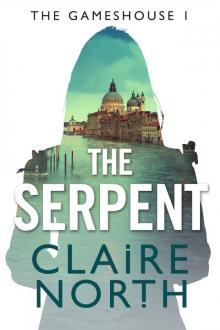 Gamehouse 01 - The Serpent
Gamehouse 01 - The Serpent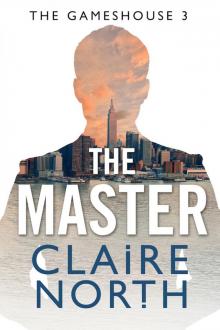 The Master
The Master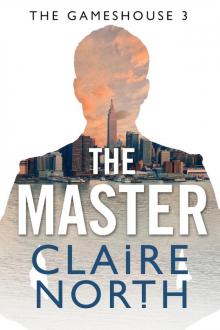 Gamehouse 03 - The Master
Gamehouse 03 - The Master The Thief
The Thief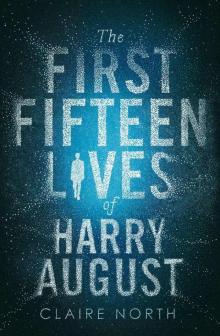 The First Fifteen Lives of Harry August
The First Fifteen Lives of Harry August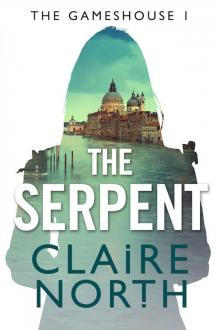 The Serpent
The Serpent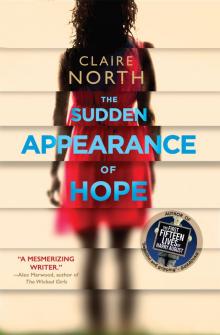 The Sudden Appearance of Hope
The Sudden Appearance of Hope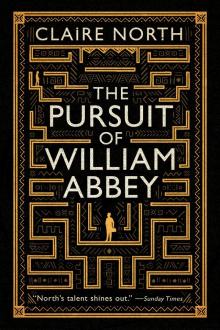 The Pursuit of William Abbey
The Pursuit of William Abbey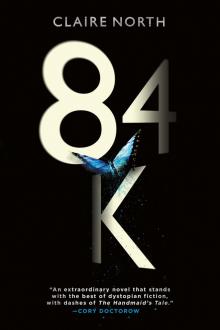 84k
84k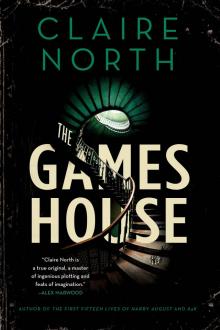 The Gameshouse
The Gameshouse Touch
Touch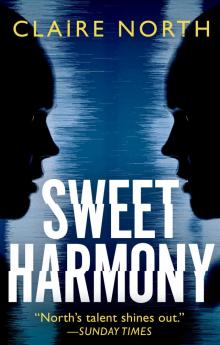 Sweet Harmony
Sweet Harmony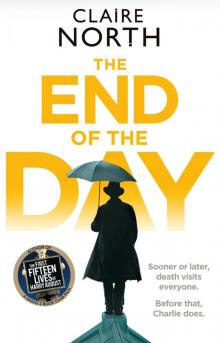 The End of the Day
The End of the Day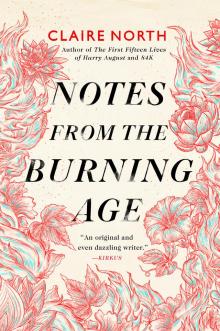 Notes from the Burning Age
Notes from the Burning Age